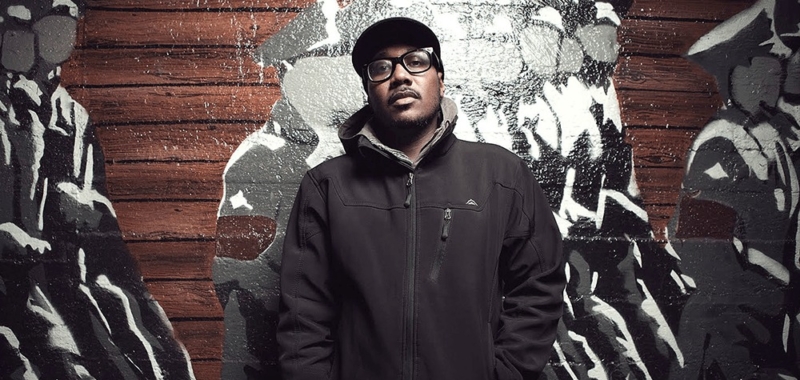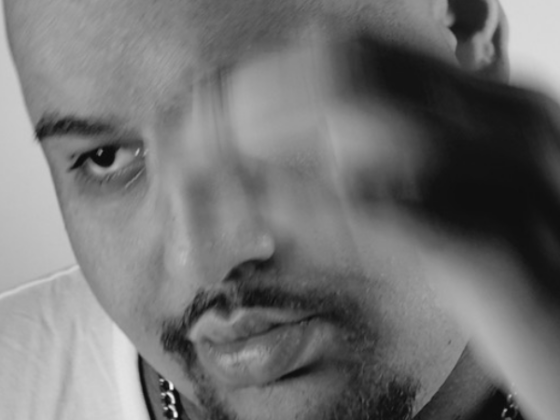Detroit rapper Elzhi’s name holds great weight in retro-fetishist circles within the broader spectrum of niche underground hip-hop. Having started on his path to unsung icon status with J Dilla’s legendary Slum Village crew, he has been steadily dropping consistently great music and flexing on suckas with his skills for 20 years to little fanfare but a fiercely loyal fanbase ready to spring from the woodwork at the drop of a fitted. Adding to his immutable legacy is his newly released fourth solo album, Zhigeist. The album is entirely produced by the freakishly talented, sickeningly prolific Georgia Ann Muldrow, barely a smoke break after her intergalactic lilblackkids project with Keith Rice. The whole project has a loose style which feels like it could have been recorded in one take and dropped with the studio nerds to fix up while the artists left to partake in cooler activities.
Muldrow’s production chops were never in question, and her work on Zhigeist does nothing to alter that. Sprinkling her usual blend of disco, funk and jazz into the crackly hip-hop brew, she imbues the project with a warm, glowing heart at the centre from which all resulting flow originates. Elzhi, perhaps used to plying his trade over more rugged instrumentals, attacks the proposition with gusto, lacing each groove with his classic braggadocio before disappearing in a purple mist. On album opener “Amnesia”, Muldrow chops in a breezy soul sample while Elzhi raps about rapping in a way that breathes fresh blunt smoke into the trope. The guy is about quotables first and foremost, and he lays them on in such density you might need to learn short-hand to catch them all. “Catch me at the swanky hotel by the water/ Where the stewardess took it from a pilot who flied charter/ Every line reek of crack, so it's not a sneak attack/When I run these lost souls who never get their sneakers back/It was written on the wall since the days of B Street/Where they got their eyes on your paper like it's a cheat sheet/Drugs, death, and karma; I've seen it with my own two/I wonder will it stay the same when they fly their drones through.”
Georgia Anne Muldrow lends her vocal talents to the bewitching “Understanding / Understanding Reprise,” propelled by a jaunty bassline, warm piano and sporadic trumpet stabs. Elzhi uses the emotional core of the song to outline Black America’s journey from slavery to the illusions of freedom espoused by current administrations. It ends on the touching sentiment of Elzhi teaching his future child of his legacy, while helping him to reach that elusive, ever-morphing American dream.
Muldrow brings further vocal tapestries and stuttering funk bass to “Already Gone”, providing Elzhi with the ideal platform to explore more spiritual themes than we have seen from the artist previously. His explorations into theology are punctuated by the classic Detroit flow, consistently threatening to careen off-beat but somehow maintaining balance and yielding pleasingly chaotic results. This irrepressible cadence makes the track instantly accessible even to those without the most rudimentary understanding of Divine Mathematics. “Now say if we use the alphabet to five, twelve is E, L/L is God, Zhi is seven/The spirit number from the highest heaven/So I'm light years ahead/I can wake up in dreams and put nightmares to bed.”
“Strangeland” finds Elzhi in his comfort zone, getting lyrical with a capital L and making several cogent points as to his prowess on the microphone. This is your textbook Midwest punchline session replete with head-crack drums and an audacious old-school piano line, sounding like an unreleased Jurassic 5 and Dilla collaboration, unreleased as it was never conceived. Multi-syllabic verbal images bombard the listener until they are coerced into shifting Elzhi up their top 10 lists as appropriate. When he utters the line “I watch a glacier fall through hellfire, hotter than a Taco Bell fryer in a building next to Belle Tire,” it is quite normal to break out in a sudden heat rash.
The mix of samples and live instrumentation employed by Georgia Anne Muldrow throughout Zhigeist, but album closer “Compassion” is where the jam session enters its own. A loosely slung bassline struts atop lush, organic drums while Muldrow incorporates her own vocals into the instrumental. Elzhi takes the opportunity to thank all those who underestimated him and continue to the same to countless others the world over. It is something of an underdog anthem, which is an apt way to wrap an album as heavy on education and motivation as it is on slick similes. It wouldn’t be unreasonable to assume that Muldrow’s beats were a huge influence on this. These ethereal productions demand more from a rapper than a detailed list of ways to verbally harm competing emcees. The album and collaboration demanded something more substantial from its chief protagonist and Elzhi has delivered so emphatically that doubters will be forced to go into hiding indefinitely and beef up their reading lists. This album is also another feather in the cap of Muldrow, whose hat must resemble a headdress by now. Whether this is a one-shot union for the two musicians or something more durable remains to be seen. Either way, the zeitgeist is enriched by Zhigeist, as well as being presumably terrified of the knowledge offered. Buy Zhigeist here.
Connect with Elzhi: Facebook | Instagram | Twitter
Connect with Georgia Anne Muldrow: Facebook | Instagram | Twitter









